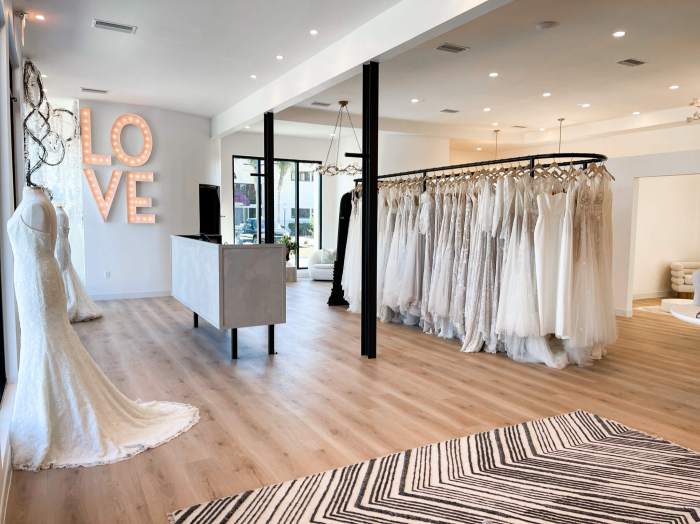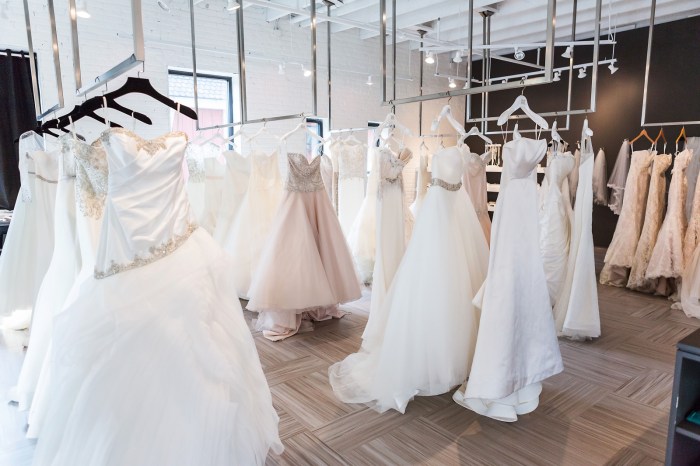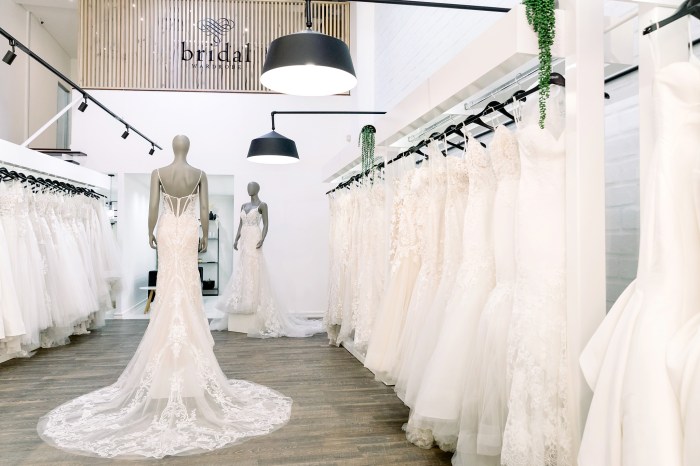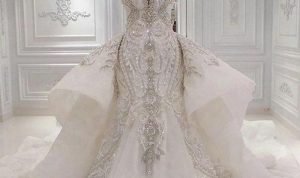Where to Buy Wedding Dresses
Where do you buy wedding dresses – Finding the perfect wedding dress is a significant milestone in wedding planning. The journey involves navigating various retailers, understanding pricing structures, and making informed decisions about style, budget, and ethical considerations. This guide explores the key aspects of wedding dress shopping, providing insights into different purchasing avenues and strategies to ensure a smooth and satisfying experience.
Where to Find Wedding Dresses: Types of Retailers
Several retail options cater to brides seeking their dream wedding dress. Each offers distinct advantages and disadvantages in terms of price, selection, and service. Choosing the right retailer depends on individual preferences and budget.
Bridal Boutiques vs. Department Stores
Bridal boutiques and department stores represent two primary avenues for wedding dress shopping. They differ significantly in their offerings and overall shopping experience.
| Feature | Bridal Boutique | Department Store |
|---|---|---|
| Price Range | Mid-range to high-end | Variable, often lower average price points |
| Selection Variety | Specialized selection, often featuring designer collections | Wider range of styles and price points, potentially less focus on bridal-specific designs |
| Personal Service | High level of personalized attention, consultations, and fittings | Variable level of service, depending on the store and staff availability |
Online vs. In-Person Shopping
The decision to buy a wedding dress online or in person presents a significant choice, each with its own set of benefits and drawbacks.
| Feature | Online Shopping | In-Person Shopping |
|---|---|---|
| Benefits | Wider selection, convenience, potential for better pricing | Ability to try on dresses, personalized service, immediate feedback |
| Risks | Difficulty in assessing fit and quality, potential for shipping delays or returns, limited personal interaction | Limited selection in some locations, higher price points in some boutiques, potential for feeling pressured |
Independent Designers vs. Larger Brands
Choosing between an independent designer and a larger brand impacts both the dress’s uniqueness and its price.
- Independent Designers: Offer unique, bespoke designs often made with higher-quality materials. Price points are typically higher due to the handmade nature and limited production.
- Larger Brands: Provide a wider selection of styles and sizes, often at more accessible price points. Quality can vary significantly across brands.
Budget Considerations and Pricing Strategies
Setting a realistic budget is crucial for a stress-free wedding dress shopping experience. Understanding the factors influencing dress prices and employing smart strategies can help brides find their dream dress without exceeding their financial limits.
Average Cost and Price Influencers
The average cost of a wedding dress varies widely. Several factors contribute to the final price.
| Factor | Impact on Price |
|---|---|
| Fabric | Silk, lace, and other luxurious fabrics increase cost |
| Embellishments | Beading, embroidery, and other embellishments add to the expense |
| Designer | Well-known designers command higher prices |
| Construction | Intricate construction techniques increase cost |
Strategies for Affordable Wedding Dresses
- Shop during off-season sales.
- Consider sample sales or trunk shows.
- Explore online retailers and consignment shops.
- Prioritize simpler designs and fabrics.
- Set a firm budget and stick to it.
Impact of Alterations on Overall Cost
Alterations are an essential part of the wedding dress process. Budgeting for alterations is crucial to avoid unexpected expenses. Expect to allocate a percentage (typically 10-20%) of the dress price for alterations, depending on the extent of adjustments needed.
The Dress Shopping Experience: Where Do You Buy Wedding Dresses
The wedding dress shopping experience should be enjoyable and empowering. Understanding the process, avoiding common mistakes, and bringing the right support system can make the experience more positive and productive.
Wedding Dress Purchase Process
- Initial Consultations: Discuss your style preferences, budget, and vision with bridal consultants.
- Dress Selection: Try on various styles and find the dress that best complements your body type and personal style.
- Ordering and Sizing: Place your order, providing accurate measurements for the chosen size.
- First Fitting: Review the initial fitting and make necessary adjustments.
- Final Fitting: Ensure the dress fits perfectly before the wedding day.
Common Mistakes to Avoid
- Not setting a budget beforehand.
- Bringing too many opinions to appointments.
- Ignoring your personal style.
- Rushing the decision-making process.
- Forgetting about alterations.
Importance of Support Persons
Choosing the right support system is crucial for a positive shopping experience. A close friend or family member can offer objective opinions and emotional support.
Beyond the Dress: Accessories and Alterations

Source: website-files.com
Accessories and alterations play a vital role in completing the wedding day look and ensuring a perfect fit. Proper care and preservation of the dress are also important.
Wedding Dress Accessories
Selecting the right accessories can enhance the overall bridal look. Veils, shoes, and jewelry should complement the dress style and the bride’s personal preferences.
Wedding Dress Alterations
Alterations are essential for achieving the perfect fit. Common alterations include adjustments to the bust, waist, length, and straps. Expect multiple fittings to ensure the dress is tailored to your body.
Wedding Dress Care

Source: ohmyveil.com
Proper care before, during, and after the wedding is crucial for preserving the dress’s condition. Cleaning and preservation services can help maintain the dress’s quality for years to come.
Ethical and Sustainable Considerations
Increasingly, brides are considering the ethical and environmental implications of their wedding dress choices. Sustainable and ethically produced gowns are gaining popularity.
Ethical and Sustainable Practices

Source: enzoani.com
Look for brands that prioritize fair labor practices, sustainable materials, and eco-friendly production processes.
Environmental Impact of Dress Materials
| Material | Sustainability | Pros | Cons |
|---|---|---|---|
| Silk | Relatively sustainable if organically produced | Luxurious, durable | Can be expensive, requires specific care |
| Organic Cotton | Highly sustainable | Soft, breathable, affordable | Can wrinkle easily |
| Lace | Sustainability varies greatly depending on production methods | Elegant, detailed | Can be delicate and require careful cleaning |
| Polyester | Not sustainable, derived from petroleum | Affordable, easy to care for | Not biodegradable, contributes to microplastic pollution |
Secondhand Wedding Dresses, Where do you buy wedding dresses
Purchasing or renting a secondhand wedding dress is a sustainable and budget-friendly option. Many online platforms and consignment shops offer pre-owned gowns in excellent condition.
Essential Questionnaire
What is the average timeframe for alterations?
The average timeframe for wedding dress alterations ranges from 4 to 8 weeks, depending on the complexity of the alterations and the tailor’s workload. It’s best to schedule alterations well in advance of your wedding date.
Can I return a wedding dress if I change my mind?
Finding the perfect wedding dress often involves exploring various bridal boutiques and online retailers. If you’re drawn to a more romantic style, consider those featuring delicate floral embellishments; you might find exactly what you’re looking for by checking out stunning options like those showcased at wedding dresses with flowers. Ultimately, the best place to buy your dress depends on your personal style and budget, so happy shopping!
Return policies vary greatly depending on the retailer and the dress itself. Some stores have strict “no return” policies, especially for custom-ordered or sale items. Always check the store’s return policy before purchasing.
How much should I budget for accessories?
The cost of accessories can vary widely. A modest budget might allocate 5-10% of the dress cost to accessories, while a more lavish budget could dedicate a larger percentage. Consider the overall style and importance of accessories in your look.
What should I do if my dress arrives damaged?
If your dress arrives damaged, immediately contact the retailer or online seller and document the damage with photos and videos. Most reputable retailers will offer a replacement or refund.

